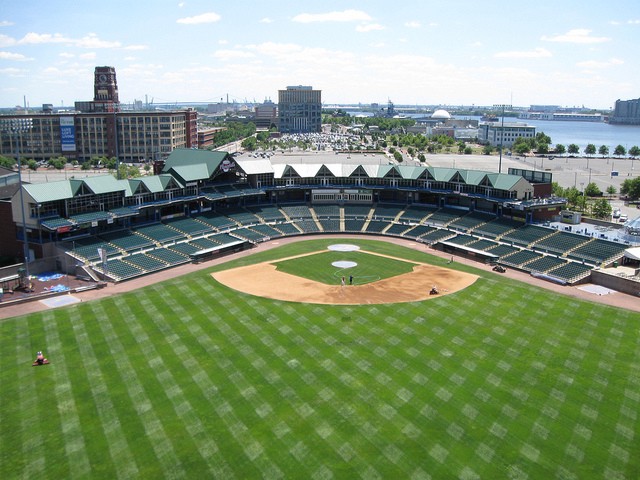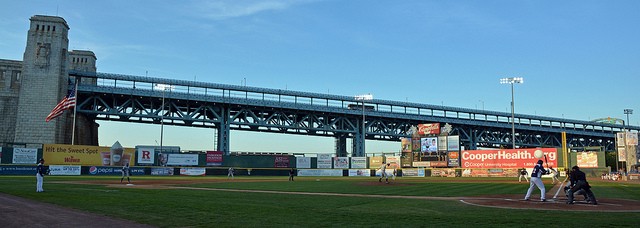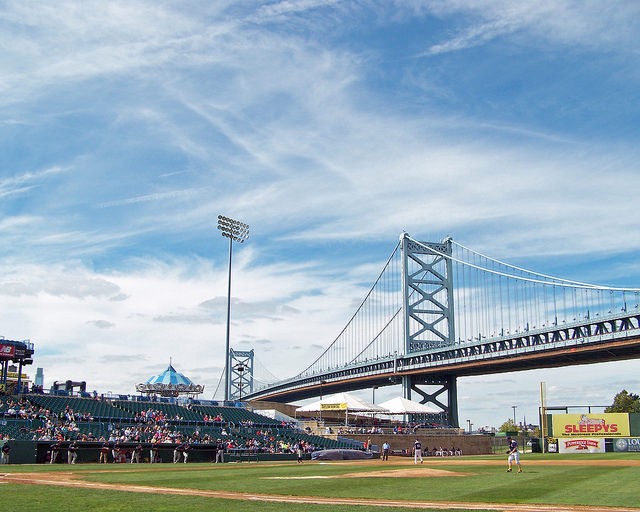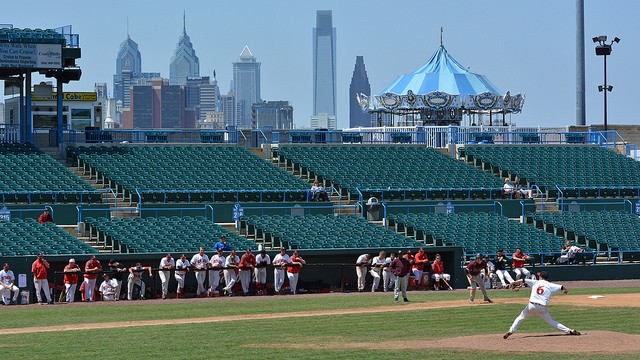Camden in the Outfield
by Andrew Thompson

The other Sunday was Wedding Day at Campbell’s Field, the ballpark for the Camden Riversharks. Fans could have their vows renewed by the team’s general manager, a recently ordained minister, right on the field. About a half hour before the opening pitch, a middle-aged couple stood at home plate while he read their vows into a microphone. “I promise to love, honor and cherish you,” boomed the park’s speakers. It echoed back from the enormous medieval-looking stones supporting the Ben Franklin Bridge, along with the sandy, metallic gliding of a PATCO train riding along the bridge’s shoulder. When the manager instructed the groom, “you may kiss the bride,” the crowd went wild. When Lil Jon’s “Turn Down for What” replaced the wedding vows, the Riversharks took the field, prompting a light patter of applause, and the game began. They scored three runs, ultimately losing to the Lancaster Barnstormers by two points.
Campbell’s Field was built on the Camden waterfront in 1998 to fill the vast tract of empty space left behind by the Campbell’s Soup Company and RCA when they vacated the area in the sixties and seventies. By then, Camden had become one of the most vivid poster children for the casualties of post-industrialism; the only development on the waterfront was Riverfront State Prison. The New Jersey state legislature, looking to rehabilitate Camden and its image, hoped to repeat the success of Baltimore’s Inner Harbor and released millions of dollars in development funds to build an aquarium, a museum inside the refurbished hulk of a battleship, a large music venue where Phish played their third-to-last pre-breakup show, and a minor league baseball stadium.

As the Riversharks were being defeated by the Barnstormers, just across the Delaware river, the Philadelphia Eagles were in the process of staging a spectacular comeback against the Jacksonville Jaguars. The stat keepers and Stewart spent much of their time distracting themselves from the baseball game by talking about the football game. “The Jaguars are up fourteen-nothing,” one of the stat keepers said early on, looking at his phone. Near the Kids’ Birthday Zone and concession counter, a sports bar full of drinkers were also watching the Eagles game. At the third inning, while purchasing boat of chicken tenders, I recognized the cacophony of an entire stadium squeezed into a tiny speaker, like a thousand bugs mouth-breathing at once, from the steel counter behind the cashier. I asked what game was playing on his radio. “The Eagles,” he said. By the fifth inning, Stewart had fallen asleep, his body a bean bag sagging over the edge of his chair, his wrist and shoulder mildly twitching.

The stadium feels like it’s in Philadelphia. Looking out from the press box, the point of focus is the Ben Franklin Bridge, which arches upward to the west and over the Delaware River to Philly, while the park’s merry-go-round, elevated on the concourse above left field, where it overlooks the river, might be the best viewing booth of the Philly skyline in the entire region. It’s only if you completely turn around from the merry-go-round’s vantage point that you see, peeking from behind the wall in back of right field, the brown towers of the Northgate housing projects — the only reminder from inside Campbell’s Field that you’re in Camden, New Jersey. The grounds outside the towers are one of the city’s more bustling open air drug markets, where dealers shout offers to sell PCP, which an East Camden woman used in 2012 when she decapitated her two-year-old son and put his head in his freezer before stabbing herself, and which a man days later used before entering a house and stabbing a six-year-old boy. That year, Camden, which has a population of just over seventy-seven thousand people, saw sixty-seven murders, a record, and an unemployment rate that peaked at 19.5 percent.
Each attraction is buffered from the others by a desert of parking lots, while the waterfront is separated from the rest of Camden by unoccupied luxury condos, which seem as if they were prefabbed with a sense of abandonment. The developments are also separated from Camden in another, crucial way: They don’t pay property taxes but instead have voluntary payment agreements with the city, making Camden’s portion of the Delaware River a Disney-like Hong Kong. And while jobs have been created, they have not gone exclusively to residents of Camden, where the unemployment rate currently stands at just under thirteen percent; the cashier listening to the Eagles at the concession stand told me he lived in Philly.

Stewart woke up when a park employee’s radio crackled with directions. “It’s time for the ice cream,” it said with the command of an air traffic controller. I couldn’t make out the pitcher’s number on the mound and asked one of the stat keepers who he was. “Ni,” he said. “Taiwanese guy.” I looked him up in one of the rosters stacked in the press room: Fu-Te Ni, thirty-one years old, started his career in the Chinese Professional Baseball League, where he pitched for the country’s fifth-place Olympic team. He was traded from the Barnstormers after spending two years in the Detroit Tigers’ AAA affiliate team. As of September 7th, he was two for five and had a 4.91 ERA. I looked over to Stewart; he had fallen back asleep.
Down in the lower deck, a little girl in pink shorts and a balloon hat was screaming at the Riversharks. “Come on Riverhsharks, why did we come here?!” She threw back a handful of Nerds, chewed, and then resumed her yelling. Another heckler, a man in his forties with greasy hair, 7–11 sunglasses, and Eagles Westbrook jersey, chided the umpire, “Hey Blue, you got a penny? Because you got nothing else going on.” He talked about the Eagles with the spectators to his left, then resumed heckling. “Hey, love your consistency or lack thereof, Blue.” He turned to the man sitting next to him. “It was nice meeting you,” he said. Then he got up and left.
Was the game over? Except for one crowd crescendo as a ball floated into a home run over left field, there was nothing indicating joy or disappointment of the progress of the game, just a low-grade swarm of unfocused activity. Children yelped, while the speakers announced that the loudest screamer would get a free slice of pizza. White noise emanated from the concourse’s food stands and sports bar and the grind of PATCO train. Yes, it was. The crowd funneled itself out of the field and through the entrance past where a Power Ranger once stood. Visitors took pictures outside the stadium, and spouses asked spouses where they had parked the car. In about an hour, with no other noise to drown it out, the whine of the PATCO train would be heard far more crisply.
Andrew Thompson is a writer living in Philadelphia.
Photos by The West End, cavalier92, Peter Miller, Paul Hadsall, and Peter Miller, respectively
